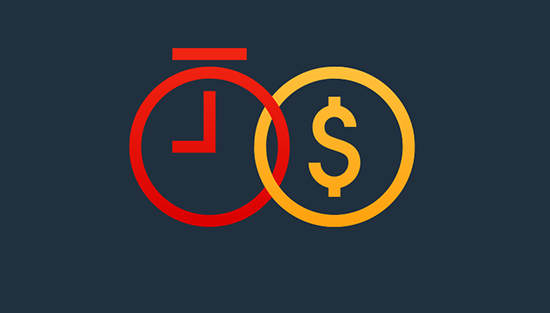
June-July 2018
Surrendering
My Places
------------------
|






Time Is Money
By Audrey Hollifield
Growing up, I always had this idea in my head about retirement. I thought it was something you didn’t have to worry about until your 30s or 40s. It was an “out-of-sight, out-of-mind” concept for me, especially when I first graduated college and started working my first full-time job as a bank teller. I remember the bank offered to put money away each month for my retirement. I shrugged it off because I thought I didn’t need to worry about it.
It wasn’t until I began working for the Board of Retirement last September that I learned my perspective was entirely incorrect. Not only is it incredibly beneficial to start putting money away for retirement in your 20s, it is also recommended. When you start early, you actually end up with more. Who knew?
Professionals recommend starting early because of a concept called “compounding.” Investopedia defines compounding as, “the process where the value of an investment increases because the earnings on an investment, both capital gains and interest, earn interest as time passes.” It goes like this: you invest a lump of funds; it gains interest; the amount of your original investment plus the interest gained then earns interest; and the process repeats.
Imagine having 40-plus years for this concept to work in your favor. This is why people start saving early. You have more time for investments and interest to build upon itself. Visualize a snowball. If you roll that snowball down a snow-covered hill, it picks up snow as it goes and turns into a huge snow boulder. It’s the same with retirement.
While starting early gives you a head start on saving and earning as much as possible toward your retirement, contributing regularly is also a factor of growth. It’s a simple concept! The more you save, the more you have. Go back to the snowball analogy: it’s like putting even more snow on the ground for the snowball to acquire as it rolls. You increase the amount in your account every time you put more money in, allowing more funds to benefit from compounding.
How does all of this fit into our lives with Christ? What does the Bible have to say? I think the perfect example of saving and investing in one’s future can be found in Genesis, when God speaks through Joseph to the King and saves Egypt from drought. Through Joseph, God laid out a specific plan to set aside a portion of food during the fruitful season to save them during the season of drought:
"Let Pharaoh do this, and let him appoint officers over the land, and take up the fifth part of the land of Egypt in the seven plenteous years. And let them gather all the food of those good years that come, and lay up corn under the hand of Pharaoh, and let them keep food in the cities. And that food shall be for store to the land against the seven years of famine, which shall be in the land of Egypt; that the land perish not through the famine" (Genesis 41:34-36).
Here, God illustrates and emphasizes the importance of taking portions from your season of fruitfulness and putting them aside for the time you’ll need it.
Start saving as early as possible and keep saving to be prepared for the seasons of life ahead. God has blessed our futures with the blessings He is providing for us now. May we be good stewards of these blessings and wise in the way we save.
The Board of Retirement offers a retirement plan to employees of any Free Will Baptist church, school, or agency. Contact our office at 877-767-7738, or visit our website to learn more.
About the Writer: Audrey Hollifield has been administrative assistant for the Board of Retirement since September 2017. She graduated from Lee University in 2014 with a B.S. degree in Human Development with an emphasis in Business.
|
|

